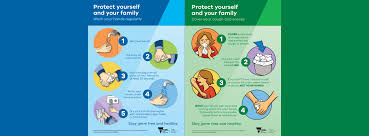As the coronavirus disease 2019 (COVID-19) pandemic evolves, people want to know how to continue protecting themselves and their families.
Below are some everyday steps that you can take now , following the latest guidance from the Centers for Disease Control and Prevention. In addition, stay informed about what’s happening in your community and always follow the directions of state and local authorities.
HELP SLOW THE SPREAD OF COVID-19
- Wash your hands often with soap and water for at least 20 seconds, especially after being in a public place, or after blowing your nose, coughing or sneezing.
- If soap and water are not readily available, use a hand sanitizer with at least 60% alcohol.
- Avoid touching your eyes, nose and mouth with unwashed hands.
- Avoid close contact with people who are sick. Some people without symptoms may be able to spread the virus.
- Stay home as much as possible and avoid non-essential travel.
- Practice social distancing by keeping at least 6 feet — about two arm lengths — away from others if you must go out in public.
- Stay connected with loved ones through video and phone calls, texts and social media.
- Cover your mouth and nose with a cloth face cover when around others and when you must go out in public, such as to a grocery store. The cloth face cover is meant to protect other people in case you are infected.
- However, do NOT place cloth face coverings on young children under age 2, anyone who has trouble breathing, or is unconscious, incapacitated or otherwise unable to remove the mask without assistance.
- In addition, do NOT use a facemask meant for a health care worker.
- Continue to keep about 6 feet between yourself and others. The cloth face cover is not a substitute for social distancing.
- See CDC guidelines, including how to create your own cloth face cover.
- Cover your coughs and sneezes. Use a tissue to cover your nose and mouth, and throw used tissues in a lined trash can. If a tissue isn’t available, cough or sneeze into your elbow — not your hands. Wash your hands immediately.
- Clean and disinfect frequently touched surfaces daily. This includes tables, doorknobs, light switches, countertops, handles, desks, phones, keyboards, toilets, faucets and sinks. Follow CDC guidance.
WHO IS AT A HIGHER RISK?
According to the CDC, early information shows that older adults, people who live in a nursing home or long-term care facility, and individuals of any age with the conditions below are at higher risk of getting very sick from COVID-19:
- Have serious underlying medical conditions, particularly if not well controlled, such as heart, lung or liver disease; diabetes; moderate to severe asthma; severe obesity; and chronic kidney disease undergoing dialysis.
- Have a weakened immune system, including those undergoing cancer treatment, smoking and having other immunocompromised conditions.
If you are at higher risk for serious illness from COVID-19, it is critical for you to:
- Stay home if possible and follow the other steps above. Avoid all cruise travel and non-essential air travel.
- Call your health care provider if you have concerns or to ask about obtaining extra necessary medications in case you need to stay home for a prolonged period of time.
- Call a medical professional as soon as COVID-19 symptoms start, if you are at higher risk.
- See CDC guidance for more information for those at higher risk.
IF YOU ARE SICK
COVID-19 symptoms include fever, shortness of breath and a cough; additional symptoms are now listed on the CDC website. Keep track of your symptoms, which may appear two to 14 days after exposure, and call to seek medical attention if your symptoms worsen, such as difficulty breathing.
Mild Illness
Most people have mild illness and are able to recover at home. If you think you are sick:
- Stay home and call your doctor for medical advice and before visiting a medical office. Older adults and people of any age with serious underlying medical conditions should call a health care provider as soon as symptoms start.
- Separate yourself from other people in your home.
- Avoid sharing personal household items, such as dishes, drinking glasses, cups, eating utensils, towels or bedding. Wash items thoroughly after using them with soap and water.
- On your own, clean and disinfect high-touch surfaces daily in your sick room and designated bathroom. Have a healthy household member do the same for surfaces in other parts of the home.
- Wear a cloth face cover if you are around other people (e.g., sharing a room or vehicle) and before you enter a health care provider’s office. See CDC guidelines.
Emergency Warning Signs
If your symptoms become severe, call to get medical attention immediately. Warning signs include:
- Trouble breathing
- Persistent pain or pressure in the chest
- New confusion or inability to arouse
- Bluish lips or face



